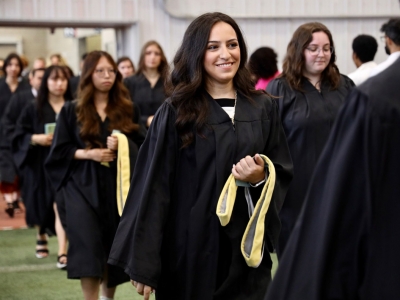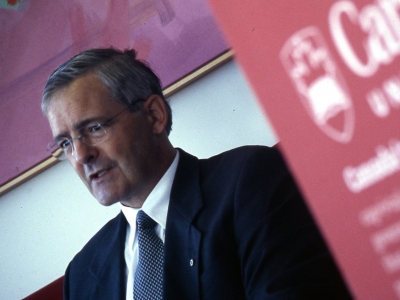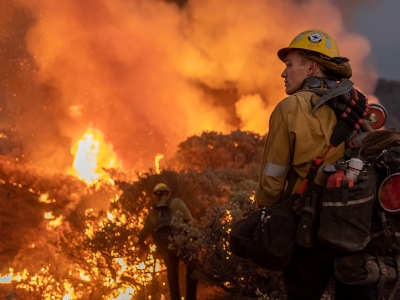Carleton University’s Jeremy Laliberté and partners from four other universities (École de technologie supérieure, Université de Sherbrooke, University of Ottawa and Queen’s University) have received $1.65 million in funding from the Natural Sciences and Engineering Research Council of Canada (NSERC) Collaborative Research and Training Experience (CREATE) program to address challenges with operating uninhabited aircraft systems (UAS).
“This is further evidence of Carleton fostering leading researchers in the area of autonomous systems, including Murray Richardson, Ana Maria Cretu and Shawn Kenny,” said Rafik Goubran, vice-president (Research and International). “Laliberté’s research will play an important role in training the next generation of innovators in drone technology, which is a major pillar of Carleton’s noted aerospace program.”
The project, Uninhabited Aircraft Systems Training, Innovation and Leadership Initiative (UTILI), will address technological challenges associated with the safe and effective operation of UAS and help train students to work effectively in this emerging sector.
“UAS are an important part of Canada’s future aviation sector,” said Laliberté, professor in Mechanical and Aerospace Engineering. “The training supported by this funding will enable scientists and engineers to take full advantage of UAS capabilities for forestry, precision agriculture and the delivery of time-sensitive products. We will establish an important UAS training and research hub in Eastern Ontario and Western Quebec with connections and partnerships throughout Canada and the United States”
Students will participate in specialized training instruction, such as ground and flight schools, and a UAS mission design and operation course.
This instruction, along with internships from industry and government partners, will provide a unique real-world UAS experiences to meet the growing global demand for qualified UAS trainees. Partners have confirmed more than 200 internship spaces worth an estimated $2.5 million. Project partners are from all regions of Canada, including the Arctic, and include small- and medium-sized enterprises, larger companies and one government department.
Additional international opportunities have been developed with the University of Alaska Fairbanks ACUASI UAS Program and Clarkson University’s (Potsdam, N.Y.) Aeronautical Engineering Program.
Laliberté’s project is part of a longstanding tradition of aerospace excellence at Carleton, which has one of the largest and most comprehensive academic aerospace research programs in Canada with a wide range of unique, state-of-the-art research facilities.
More than 30 award-winning researchers contribute to undergraduate and graduate aerospace programs that are among the largest in Canada. Carleton introduced the country’s first Bachelor of Aerospace Engineering program in 1988 and the first team-based final year project in aerospace engineering in 1992. To learn more about the history and evolution of aerospace at Carleton, please click here.
Highlights in recent years include an alumnus winning a significant award from NATO, groundbreaking support for female aerospace engineers, a visit from NASA’s top official for the demonstration of a space rover created by a Carleton-supported company, a project to improve the black box system used to investigate airline accidents, and the continued success of the Ravens Racing team led by Mechanical and Aerospace Engineering students.
For more information, please see Carleton’s unmanned aerial vehicle website and the Carleton Aerospace website.
Media Contact
Steven Reid
Media Relations Officer
Carleton University
613-520-2600, ext. 8718
613-265-6613
Steven_Reid3@Carleton.ca
Carleton Newsroom: https://newsroom.carleton.ca/
Follow us on Twitter: www.twitter.com/Cunewsroom
Need an expert? Go to: www.carleton.ca/newsroom/experts
Thursday, July 11, 2019 in News Releases
Share: Twitter, Facebook



